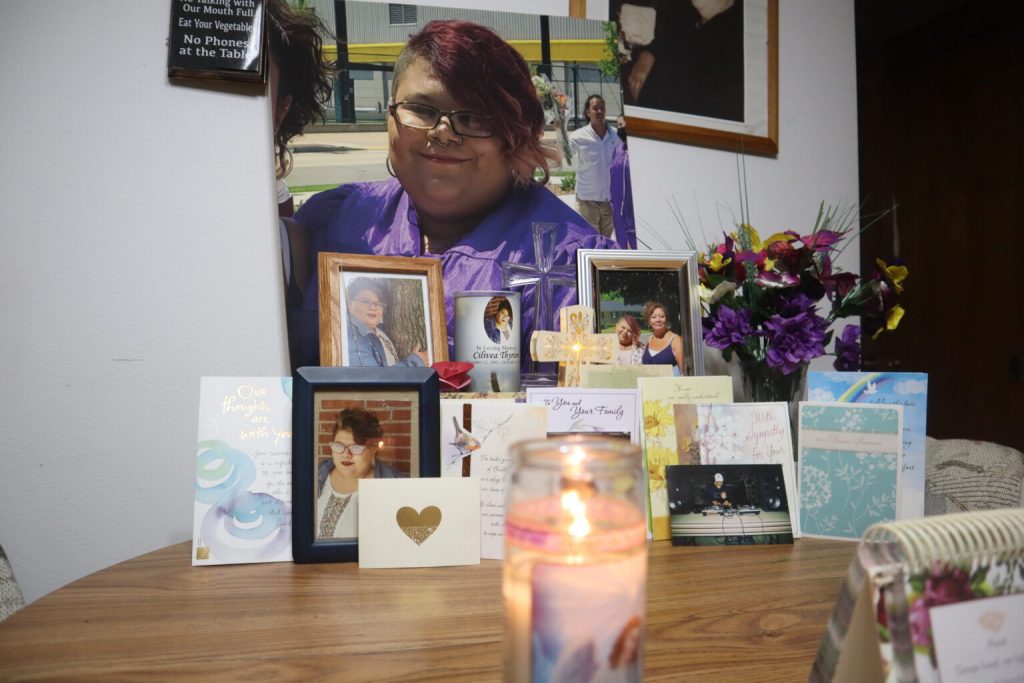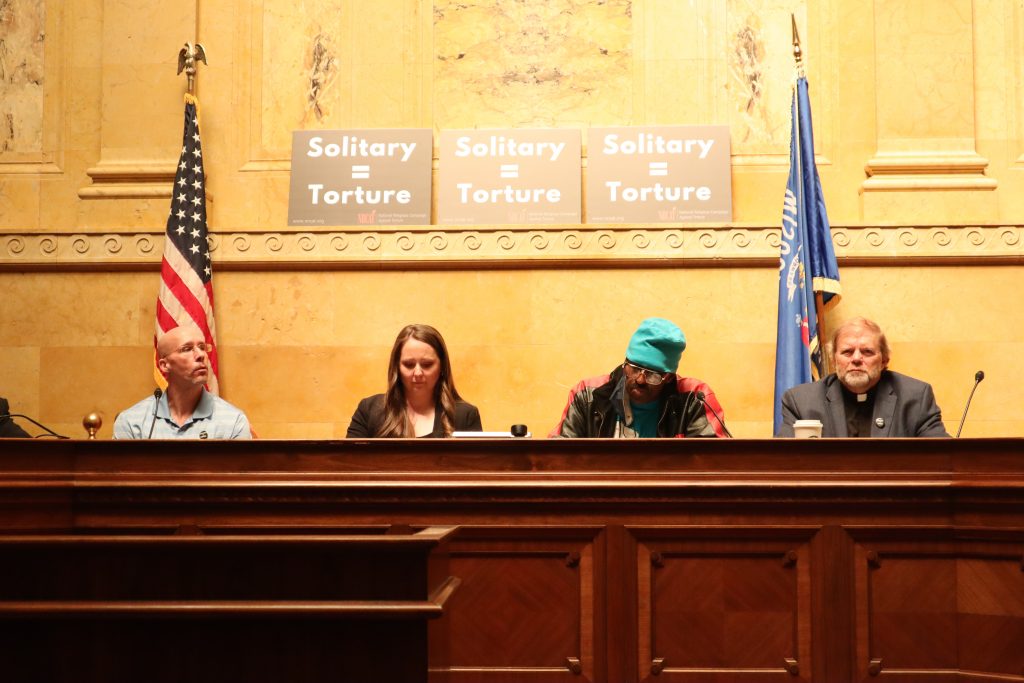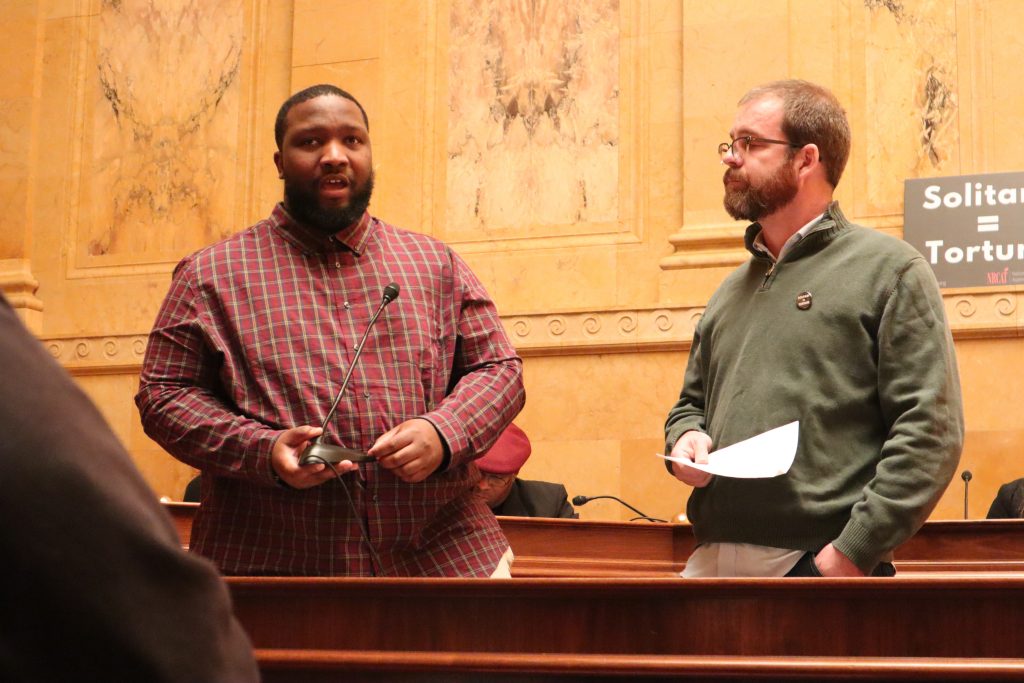The Long Road To End Solitary Confinement in Wisconsin
"The hole" is torture on those confined to it argue opponents at legislative action day.

A memorial for Cilivea Thyrion, who died in the Milwaukee County Jail in 2022, erected in her mother’s Green Bay home. (Photo | Isiah Holmes)
Nearly a year and a half has passed since Kerrie Hirte – a mother from Green Bay – learned that her 20-year-old daughter, Cilivea Thyrion, had committed suicide while confined in a solitary cell at the Milwaukee County Jail. Since that December day in 2022, Hirte has grappled with painful questions about how to protect others from what her daughter experienced. For Hirte and many others there is no solution without an end to solitary confinement in jails and prisons.
On Tuesday dozens of opponents of solitary confinement gathered in the Wisconsin State Capitol for a day of action. Hosted by faith groups, criminal justice reform advocates, formerly incarcerated people and their families and elected officials, the activists decried the use of solitary confinement as torture. After sharing testimonies, the group dispersed throughout the Capitol to visit legislative offices and lobby for reform, and compassion.

Panelists during a day of action at the Capitol call for an end to solitary confinement. (Photo | Isiah Holmes)
Hirte didn’t visit the legislative offices, something she has done several times over the months that have passed since Thyrion’s death. Instead, the grieving mother listened to the testimonies of others who have lost loved ones in solitary confinement as well as people who have experienced solitary themselves. “It saddens me, because it shows just how broken our system really is, and how much we really need to change it, and how much we really need community support rather than putting people in jails where they can be victimized,” Hirte told Wisconsin Examiner, reflecting on the mixed sense of community and shared agony she felt hearing other people’s stories.
A grim practice
Tuesday’s day of action began and ended with prayer from faith leaders calling for an end to the use of solitary confinement. Jails and prisons across the country employ solitary confinement, which is known by different names depending on the facility. For incarcerated people, however, solitary confinement is often colloquially known by a single name — the hole. You can be sent there for any number of reasons including being perceived as a danger to yourself or others, having a mental health crisis or for committing a minor rule violation.
“I’ve been there, done that,” said Talib Akbar, a formerly incarcerated man turned activist, during the Tuesday event in Madison. Akbar was released from the Waupun Correctional Institution in 2013, after serving 20 years. During his prison sentence, Akbar spent multiple stints in solitary confinement. “It’s no joke,” Akbar told the crowd. “It changes you, it alters you in some type of way.” Akbar expressed his sympathy for other people who have suffered from the practice. “Solitary confinement is torture,” he said.
Melissa Luden, statewide Coalition and Relations Advocate for the American Civil Liberties Union (ACLU) of Wisconsin, called the prison system “a very violent environment, it is a system that is violent.” Luden described grim conditions of confinement in Wisconsin as a public health crisis. “Where is our Department of Health and Human Services on the lockdowns of Wisconsin?” she asked.

Rep. Darrin Madison (D-Milwaukee) with Rep. Ryan Clancy (D-Milwaukee) during the day of action to end solitary confinement. (Photo | Isiah Holmes)
Last year, the state’s Department of Corrections (DOC) implemented “modified movement” orders at prisons in Green Bay, Waupun, and Stanley. The orders essentially lock down the prisons by restricting general movement, recreational activity, and visitation rights. Safety concerns and understaffing motivated the lockdowns, the DOC has said. As the months have passed, however, increasingly disturbing reports have emerged about the conditions within the prisons as the lockdowns continue.
Incarcerated people continue to face the same experience, including in the Wisconsin prisons under lockdown orders. Waupun has reported a string of deaths during lockdown. Among them was 60-year-old Dean Hoffmann, who committed suicide after being placed in a solitary cell for nine days during Waupun’s modified movement order. A wrongful death lawsuit filed by Hoffmann’s family earlier this year alleges that the prison showed “deliberate indifference” to Hoffmann, who had struggled with mental illness for many years. For more than three-quarters of his time at Waupun, prison staff failed to provide Hoffmann his medication for depression and bipolar disorder. The lawsuit alleges that there is also no evidence that Hoffmann received his medication while in solitary.
Hoffman’s daughter, Megan Hoffmann-Kolb, was among the speakers in the Capitol Tuesday, joined by her brother Barry. “It is my belief that the reason solitary confinement exists, and even persists today, is because people that it impacts are not even seen as human in the first place,” said Hoffman-Kolb. “My dad, who was on federal disability for over 30 years due to his mental illness, spent the last nine days on Earth in solitary confinement alone, calling out for help, begging for his medications, and completely ignored.” Four deaths have occurred at Waupun since last June, including a man who died of a fentanyl overdose and another who had a stroke.
Hirte said Tuesday that she hopes lawmakers will learn about the plight of people like her daughter Cilivea. She told Wisconsin Examiner that officials should focus on “allowing them to have communication, religion, support systems, being able to be clean and have running water, healthy food.”
“I hope they end the solitary confinement, because that does nobody good,” Hirte added. “When it comes to putting mental illness in a cell block and locking them away, it makes it 100 times worse than a normal person. So I believe there’s just going to be more deaths in the system due to the confinement.”
Messages from Cilivea
Over the past several months Hirte has learned more details about what happened to her daughter. Thyrion’s stay at the Milwaukee County Jail lasted most of 2022, after she arrived there in February. Medically private information has been redacted from both the death investigation conducted by the Waukesha County Sheriff’s Department and the Milwaukee District Attorney’s two-page summary decision not to file criminal charges in the case. Wisconsin Examiner obtained both documents through open records requests.
During a Milwaukee Fire and Police Commission meeting last week, Hirte said it took four months to see video of her daughter’s death, which remains unavailable to the public.
In late 2023, the jail finally released Thyrion’s belongings to her mother. Wisconsin Examiner was invited to observe as Hirte went through the bags in December 2023. They included letters written to and from her daughter, legal documents related to her arrest, Thyrion’s phone, inhaler, photocopies of her mail, books, playing cards, calendars used by Thyrion to keep track of passing time, a full, unlabeled urine sample container, and other items.
Among the first things Hirte pulled out of the bag was a handwritten note from her daughter. “I need to see the psych about my meds,” Thyrion wrote to jail staff. “I think I need a med adjustment. Can it please be the female doctor[?]” The correspondence, undated though signed by Thyrion, appears to be a grievance report document used by incarcerated people to communicate needs to jail staff.
Separately, Thyrion raised concerns while at the Milwaukee County Jail, according to records of requests included among the Waukesha Sheriff’s file.
Thyrion requested a new cellmate and to be transferred to the HOC — now known as the Community Reintegration Center — but was denied by the jail. In early April 2022, she complained about a jail staffer who Thyrion wrote, “has been really rude, she has been calling me ‘crazy B****’ and making fat jokes towards me and just has a really disrespectful mouth.” The jail replied that the staff member in question no longer worked for the Milwaukee County Sheriff’s Office. In late March, Thyrion reported that after she asked for a new pair of pants to replace the ones she had which had holes, a jail staffer, “just sat there and ate her sunflower seeds and said in a very rude mannor that she did not have no pants and to leave her alone she also did not even look for them and then when I asked her to give me some liquid soap she said in a rude mannor again that she did not have any and again did not look and proceeded to eat.” The jail later responded, “requests cannot be expected to be adhered to instantaneously. We all have a job to do and running a housing unit takes precedent over retrieving items for inmates, if time does not allow for it.”
In mid-August, Thyrion reported that a correctional officer had “stated that he was going to burn my fu***** eyes out then he was trying to fix my cuff and he was hurting my arm so I resisted and he said i don’t care if I hurt your a** he was really rude and disrespectful and highly unprofessional.” The jail’s response to Thyrion countered that the sergeant in question warned her that he’d use OC spray if Thyrion “continued to [redacted] and make threats. He denied making those exact statements you are grieving. He was reminded to remain professional.”
Thyrion sent more messages in August 2022 questioning why she wasn’t receiving mail, and whether she could be moved out of protective custody. Medical issues also arose for the 20-year-old, who asked, “if I can get some cream for my feet they are cracking and bleeding really bad.” Thyrion was asked by the jail to put in a sick call slip, per policy, in order to be seen. Thyrion complained about another officer in October, who, she wrote, “puts my trays on the floor like I am a dog and does not provide me with anything to drink [no cup for water no milk.]” In early November, she again asked for a cream “for my face my [redacted] is getting worse can I also get some cream for my feet they are cracking and bleeding.” Later that month, according to Thyrion, another correctional officer mocked her while she was in a restraining chair. In another message, she requested a specific officer by name saying “I promise to be better I Just need to talk to her please she’s a good friend she’s great to talk to please she was in cell four please I’m sorry.” The jail’s response was: “Request denied at this time.”
The last message Thyrion sent jail staff was on Dec. 12, just a few days before her death. She complained about a jail staffer who she claimed used the intercom to call her fat, insulted her family, and said she “looked pathetic telling my I need to loose weight and that no one in my family should have raised an inmate and she said some other things that I don’t want to put on here.” In the message, Thyrion said that the mockery started because she threw up her food. “She said that maybe if I would stop eating everything I would not be throwing up so could someone please talk to her.” The messages, which were provided as part of the Waukesha Sheriff’s investigation into Thyrion’s death, do not document a reply from the jail.
Hirte said that her daughter’s case has been slowed by the Milwaukee Sheriff’s reluctance to provide certain files. “Why haven’t they released the video on Cilivea,” Hirte asked Wisconsin Examiner. “And why aren’t they releasing everything to the lawyers if they say that it is no longer under investigation?”
The long road to end solitary confinement in Wisconsin was originally published by Wisconsin Examiner.





















